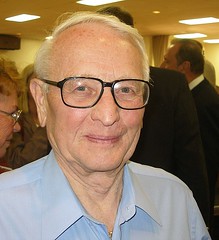A version of this was published in The Santa Fe New Mexican
March 1, 2010
David F. Cargo was an "outsider" who was elected governor less than 10 years after he moved to New Mexico. A Republican proud of his ties to labor unions and civil rights groups, he was most comfortable with the people of rural Hispanic communities.
He was a reformer who fought the old patronage system but built curious alliances with old-time Northern New Mexico political bosses like Emilio Naranjo and Tiny Martinez.

At times he found himself scorned by Democrats and blasted by his fellow Republicans. But he always took a certain pride at the nickname he earned when he was governor: "Lonesome Dave."
And that's the title of his freshly published autobiography.
Cargo will read from and sign copies of Lonesome Dave: The Story of New Mexico Governor David Francis Cargo, published by Sunstone Press, at 6 p.m. Monday at Collected Works Bookstore & Coffeehouse, 202 Galisteo St.
Cargo served two two-year terms as governor beginning in 1967. It was a tumultuous time in New Mexico.
This was the era of the infamous June 1967 raid on the Tierra Amarilla courthouse by land-grant activist Reies Lopez Tijerina and the Alianza Federal de Mercedes. A state police officer, Nick Saiz, and a jailer, Eulogio Salazar, were shot and a wire-service reporter, Larry Calloway, was held hostage by the Alianza. (Salazar, who claimed Tijerina was the one who shot him, was abducted and beaten to death shortly before a raid-related court hearing. Cargo said an attorney general investigation in the '70s cleared Tijerina of the slaying.)
It was a time of unrest on The University of New Mexico campus, with the National Guard bayoneting student protesters and at least one passer-by during a 1970 demonstration. Cargo was heavily criticized for being on a fishing trip with a national television journalist when the Guard was called out. (Cargo points out that he never got to fish on that trip because one of the reporters had a heart attack.)
It also was an era of political change in the state. Lonesome Dave documents the thick tradition of corruption in state government of that time.
In the foreword to the book, Dennis Domrzalski wrote of Cargo's career in the Legislature before he became governor: "He railed loudly and publicly against corruption in a state that seemed to think that corruption was perfectly normal. He introduced bills that demanded that state legislators actually report the bribes they had taken. He threatened to pave state roads with corrupt highway commissioners."
"There were no lobbying or conflict-of-interest laws," Cargo writes. "Lobbyists gave legislators cars and trucks. Legislators gave themselves no-bid contracts to furnish the state Capitol. Lawmakers who were charged with building the new state Capitol went out and bought the land where the new building would be and sold it — at a profit — to the state. Governors handed out liquor licenses like candy — actually for campaign contributions. State employees were forced to buy life insurance. One of the brokers — another lawmaker — had that contract."
This attitude was shared by high-ranking officials as well as many state employees, he said. Cargo tells of his effort to account for all the vehicles in the state motor pool.
"We found a car in Mexico City, one in Juárez and one somewhere in Florida — a state worker and his wife were on their honeymoon," Cargo recalls. "They were all somewhat offended when we asked for the cars back."
One employee begged the governor, "Just take me off the payroll and let me keep the car. I really like this car." Cargo explained he couldn't do that. "Then I got an answer that put everything into perspective. 'The hell with this modern government,' he said with more than a little bitterness. 'I don't like it.' "
Members of both parties were guilty. Cargo recalls a Republican woman he appointed to the local draft board in Mora. "I started getting phone calls — dozens of them," he writes, "It turned out she was drafting only Democrats! She would just draft them and they would go away just like that. It was an effective way to get rid of the opposition, but it was wrong."
When Cargo confronted her, she responded, "They're all Democrats! They should be drafted!" Cargo writes, "Needless to say, I took her off the draft board and put her somewhere she could do less harm."
In the end Cargo was done in not by the Democrats, but by the growing conservative wing of his own party. Attempting to win a seat in the U.S. Senate, Cargo was defeated in the GOP primary by Anderson Carter, who attacked Cargo's support for civil rights, unions and for being "closely aligned with the left wing of the Democratic Party."
"I ran for other offices after my two gubernatorial terms," Cargo writes in the book's prologue. "I mostly fell short. But, over the years I've come to realize that being governor was the job for me; the one I loved and the one that I could have done forever and ever."
And he confesses, "... sometimes I still get the urge to sit down, get to my pen or typewriter, and work up an executive order or two."
Contact Steve Terrell at 986-3037 or sterrell@sfnewmexican.com. Read his political blog at roundhouseroundup.com.
IF YOU GO
Who: Former Gov. David Cargo
What: Reading and book signing for release of Lonesome Dave: The Story of New Mexico Governor David Francis Cargo
When: 6 p.m. Monday
Where: Collected Works Bookstore & Coffeehouse, 202 Galisteo St.




